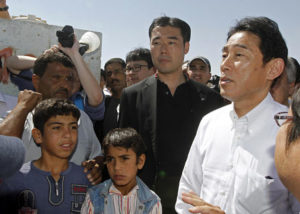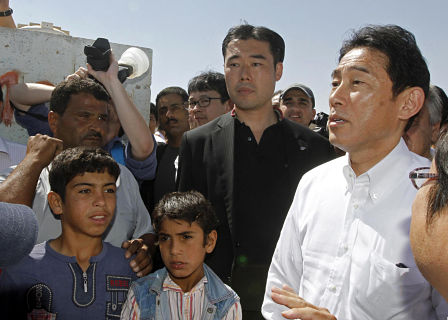
In early March, four Syrian men filed a lawsuit against Japan’s Ministry of Justice, challenging the rejection of their refugee applications. The group arrived in Japan in 2012 and applied for refugee status, citing the potential for persecution for their participation in pro-democracy protests against the Syrian government. The Ministry rejected their refugee status in early 2013, and instead granted them each a temporary residence permit under a “humanitarian perspective.” This type of permit allows the men to work full time and to participate in the national health care and other social programs. But while this seems like a compromise, the permits must be renewed every year, unlike refugee certificates which are permanent; and permit holders are excluded from certain assistance programs such as language training and employment help that the government grants to certified refugees. Perhaps the greatest disadvantage the lack of refugee status prevents for the Syrians is the difficulty, or near impossibility, it is to get their families into the country. Their lawsuit seeks to obtain official refugee status and the full rights and protections that it provides.
Japan’s Immigration and Refugee Recognition Act explicitly refers to the 1951 Convention in its definition of “refugee” as well as in the reasons a temporary refuge may be granted at the border. Further, the Ministry of Justice itself uses the Convention’s definition of a refugee in its guidelines for refugee status. The Convention defines a refugee as a person who has a “well-founded fear” of persecution. In practice, the Ministry tends to grant refugee status to those who are in danger of being “personally targeted” by their home government which, according to the lawsuit, is a higher standard than what the Convention requires.
The Convention’s language of having a “well-founded fear” is too vague on its face to offer any sort of guidance, and the term has no further definition anywhere in the Convention. Instead, the United Nations High Commissioner for Refugees (UNHCR), provides a handbook to “guide government officials, judges, practitioners, as well as UNHCR staff applying the refugee definition.” In this handbook, the UNHCR considers the term “well-rounded fear” to have both a subjective and objective element. Subjective in the person’s motivation for seeking the refugee status; and objective in viewing that motivation within the context of their country of origin or what brought about the motivation in the first place. When considering whether there is a “well-founded fear”, the UNHCR places most of the weight on the subjective element while the objective element provides a context to assess the credibility of the refugee.
With this framework in mind, will the Syrian refugees’ case against the Ministry be successful? The answer, naturally, depends most notably on the Ministry’s use of “personally persecuted” when determining refugee status. Assuming that the terms “personally persecuted” mean that the person is being targeted by their home government and will be arrested the moment they step off the plane, it would seem that the Ministry puts more weight on the objective element of having a “well-rounded fear” instead of the subjective element as the UNHCR states. Indeed, if a requirement for refugee status is to be a target, then this would effectively do away with the term “well-founded fear of persecution” and replace it with “actual persecution.” Supporting this interpretation are further explanations in the UNHCR handbook. A refugee’s fear of persecution, according to the handbook, need not be based on their own personal experiences or the fact that they have previously been persecuted. The fear could be based on persecution of people in a similar situation, or persecution of friends or family. The UNHCR further considers that “fear” applies both to those who have actually been persecuted and those who wish to avoid being persecuted. The Ministry’s standard of “personally persecuted” could be found to be incompatible with 1951 Convention and the standards of the UNHCR.
Japan has been a party to the 1951 Convention since 1981 and has given no reservations or declarations to any provision. As such, the Ministry of Justice should be bound by the provisions in the Convention and it is likely that it has applied a higher standard than is necessary. If the lawsuit is successful, it will provide hope for the hundreds of refugee seekers who have been denied the status due to Japan’s rigid and restrictive system.
Leonard Large is a 3L at the University of Denver Sturm College of Law and is Candidacy Editor for the Denver Journal of International Law and Policy.


